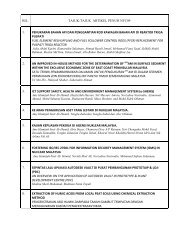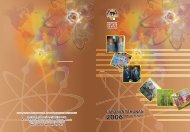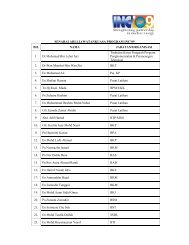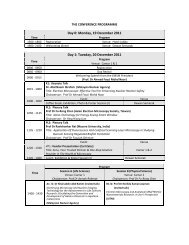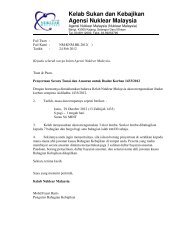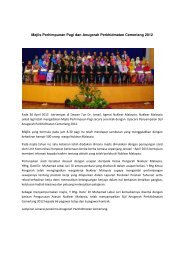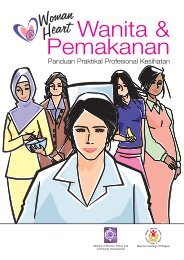Joint Media Statement By the Minister of International Trade ...
Joint Media Statement By the Minister of International Trade ...
Joint Media Statement By the Minister of International Trade ...
- No tags were found...
Create successful ePaper yourself
Turn your PDF publications into a flip-book with our unique Google optimized e-Paper software.
<strong>Joint</strong> <strong>Media</strong> <strong>Statement</strong><br />
<strong>By</strong> <strong>the</strong> <strong>Minister</strong> <strong>of</strong> <strong>International</strong> <strong>Trade</strong> & Industry,<br />
Dato’ Sri Mustapa Mohamed and <strong>the</strong> <strong>Minister</strong> <strong>of</strong> Science, Technology and Innovation,<br />
Datuk Dr. Maximus Johnity Ongkili<br />
on <strong>the</strong><br />
Report <strong>of</strong> <strong>the</strong> IAEA Review Mission on <strong>the</strong> Radiation Safety Aspects <strong>of</strong><br />
<strong>the</strong> Lynas Project, Pahang<br />
30 June 2011, 11.00am<br />
1. Two months ago, <strong>the</strong> Malaysian Government requested <strong>the</strong> <strong>International</strong> Atomic Energy Agency (IAEA) to<br />
undertake an independent review <strong>of</strong> <strong>the</strong> safety aspects <strong>of</strong> <strong>the</strong> proposed Lynas plant in Pahang, and to report its<br />
findings and recommendations to <strong>the</strong> Government. Towards this end, <strong>the</strong> IAEA appointed an expert panel <strong>of</strong><br />
nine members – one each from Canada, India, <strong>the</strong> United Kingdom, <strong>the</strong> Ne<strong>the</strong>rlands and South Africa, and four<br />
from <strong>the</strong> IAEA. All are world renowned experts in disciplines related to radiological health and safety. The panel<br />
members visited Malaysia from 29 May to 3 June on a fact-finding mission and during <strong>the</strong> course <strong>of</strong> this<br />
consultation it also received submissions from a wide cross-section <strong>of</strong> <strong>the</strong> public, including residents<br />
associations, community groups, non-governmental organizations, pr<strong>of</strong>essional bodies and political parties.<br />
2. We are pleased to announce that <strong>the</strong> completed IAEA Report was submitted to <strong>the</strong> Malaysian Government<br />
today. (The Report can be accessed from 1.30pm (Malaysian time) at <strong>the</strong> IAEA’s website<br />
http://www.iaea.org/newscenter/news/pdf/lynasreport2011.pdf). It can also be viewed via hyperlink at MITI’s<br />
website (http://bit.ly/m431qy) and MOSTI’s website (www.mosti.gov.my).<br />
3. The 55-page Report covers issues dealing with:<br />
i. Radiation protection (occupational, public health and safety, environment)<br />
ii. Waste management<br />
iii. Decommissioning and environmental remediation<br />
iv. Transport<br />
v. Safety assessment<br />
4. Main Finding<br />
The IAEA Report concluded that it did not find any instance <strong>of</strong> “any non-compliance with international radiation<br />
safety standards” in <strong>the</strong> Lynas project. This finding is an endorsement <strong>of</strong> <strong>the</strong> work <strong>of</strong> <strong>the</strong> two regulatory bodies<br />
which started since 2007 – <strong>the</strong> Atomic Energy Licensing Board (AELB) and <strong>the</strong> Department <strong>of</strong> Environment –<br />
which have ensured that all aspects <strong>of</strong> <strong>the</strong> Lynas project have complied with international safety standards. This<br />
conclusion <strong>of</strong> <strong>the</strong> IAEA is also consistent with <strong>the</strong> Government’s view that <strong>the</strong> AELB and DOE have pr<strong>of</strong>essionally<br />
discharged <strong>the</strong>ir duties and ensured that <strong>the</strong> company complied with <strong>the</strong> necessary safety standards. The IAEA<br />
Report fur<strong>the</strong>r points out that Malaysian laws and regulations regarding radiation safety are “comprehensive”<br />
and “conform to IAEA standards”. It adds that in some cases, Malaysia’s regulations are stricter than<br />
internationally accepted safety standards.<br />
5. Recommendations<br />
The IAEA Report makes eleven (11) recommendations, based on <strong>the</strong>ir observations and public consultations on<br />
29 May to 3 June, to improve <strong>the</strong> management <strong>of</strong> <strong>the</strong> regulatory function by AELB and o<strong>the</strong>r agencies. The<br />
Government accepts <strong>the</strong>se recommendations and will announce a timeframe for <strong>the</strong>ir implementation.<br />
The recommendations include <strong>the</strong> following:<br />
i. Atomic Energy Licensing Board (AELB)<br />
The IAEA Report stated that in its opinion, “<strong>the</strong> AELB is capable <strong>of</strong> carrying out its duties”. However, it<br />
recommends that <strong>the</strong> agency be streng<strong>the</strong>ned so that it “has sufficient human, financial and technical<br />
resources, competence and independence” to do its job.
ii.<br />
iii.<br />
Improved Public Communications<br />
The Report emphasized <strong>the</strong> need to improve public understanding <strong>of</strong> actions taken by AELB, especially<br />
those relating to inspection and enforcement at <strong>the</strong> Lynas plant. It recommends that <strong>the</strong>re be more<br />
transparency and greater involvement <strong>of</strong> residents and o<strong>the</strong>r stakeholders in this process to develop<br />
more trust in <strong>the</strong> “competence, integrity and impartiality” <strong>of</strong> <strong>the</strong> regulatory bodies.<br />
Waste Management<br />
The IAEA Report noted that waste management is ultimately <strong>the</strong> responsibility <strong>of</strong> <strong>the</strong> company, and<br />
that Lynas should be required to submit - before <strong>the</strong> start <strong>of</strong> operations - a comprehensive long-term<br />
waste management plan for <strong>the</strong> approval <strong>of</strong> AELB. The plan should also deal with issues arising from<br />
<strong>the</strong> decommissioning and dismantling <strong>of</strong> <strong>the</strong> plant at <strong>the</strong> end <strong>of</strong> its life, and remediation <strong>of</strong> <strong>the</strong><br />
environment.<br />
The Report fur<strong>the</strong>r recommends that a Fund, to be financed by Lynas, be set up to cover <strong>the</strong> cost <strong>of</strong> <strong>the</strong><br />
long-term management <strong>of</strong> waste, including decommissioning and remediation.<br />
6. Government’s Position<br />
i. The Government has consistently taken <strong>the</strong> position that <strong>the</strong> future <strong>of</strong> <strong>the</strong> Lynas project will be<br />
decided objectively based on facts and reason, not emotion or politics. This was <strong>the</strong> reason for its<br />
invitation to <strong>the</strong> IAEA to appoint an independent body <strong>of</strong> experts to give <strong>the</strong> people <strong>of</strong> Malaysia a<br />
second opinion on <strong>the</strong> safety aspects <strong>of</strong> <strong>the</strong> issue. This IAEA Report will contribute in a very<br />
constructive way to this debate by defining <strong>the</strong> issues that really matter.<br />
ii.<br />
iii.<br />
iv.<br />
To move <strong>the</strong> project forward, Lynas will be required to provide - for AELB’s consideration and approval<br />
- a comprehensive long-term detailed plan for waste management, including at <strong>the</strong> decommissioning<br />
and remediation level. This must be done before any fur<strong>the</strong>r licensing approval can be considered. The<br />
Government will ensure that Lynas complies fully with this recommendation <strong>of</strong> <strong>the</strong> IAEA Report. Until<br />
this is done, <strong>the</strong> status quo remains: <strong>the</strong>re will be no importation <strong>of</strong> raw materials into <strong>the</strong> country,<br />
and no operational activities will be allowed on site.<br />
The Government reiterates its position that public safety remains its highest priority, and that it will<br />
do whatever is necessary to ensure that this is not compromised.<br />
The Government is <strong>of</strong> <strong>the</strong> view that <strong>the</strong> rare earth industry must be properly managed but not<br />
avoided. Rare earth minerals are used in <strong>the</strong> manufacture <strong>of</strong> many modern day appliances and<br />
machinery, and are critical to <strong>the</strong> production <strong>of</strong> <strong>the</strong> next generation <strong>of</strong> high technology and green<br />
technology products. The key issue is <strong>the</strong> proper management <strong>of</strong> such an operation, and <strong>the</strong><br />
Government remains wholly focused on getting this right.<br />
v. We like to reiterate that <strong>the</strong> Government has accepted all <strong>the</strong> Recommendations <strong>of</strong> <strong>the</strong> IAEA Report,<br />
and will ensure that <strong>the</strong>y will be implemented. The relevant regulatory bodies will continue to<br />
undertake <strong>the</strong> necessary monitoring and enforcement measures to ensure that all aspects <strong>of</strong> public<br />
health and safety are satisfactorily addressed.<br />
…………………………………..



